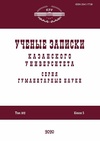Периферийная зона восприятия прецедентного имени: Плюшкин как полисемантичная единица коммуникативного сознания
Peripheral zone in precedent name perception: Plyushkin as a polysemantic unit in the communicative consciousness
Author(s): Anna Sergeyevna TitovaSubject(s): Semantics, Russian Literature, Eastern Slavic Languages, Philology
Published by: Казанский (Приволжский) федеральный университет
Keywords: precedent phenomenon; precedent name; perception invariant; peripheral perception zone; distinctive features; linguocultural environment; communicative consciousness;
Summary/Abstract: The major distinctive features of the polysemantic precedent name Plyushkin as a product of the linguistic and cultural environment and a phenomenon of the cognitive base were analyzed. The name Plyushkin is widely used to refer to a certain character trait and appearance. It was invented by N.V. Gogol in his poem “Dead Souls” (‘Mertvye Dushi’). The contexts in which the Russian national linguocultural community commonly uses the name Plyushkin were analyzed: it was revealed that most Russians associate this name with stinginess and overstocking; therefore, these two features constitute the core perception zone of the name. Particular attention was paid to the peripheral perception zone of this name, which includes individual attitudes to Plyushkin that influence the way the overall context of the text where it appears is perceived by the recipient. In the peripheral perception zone, the name Plyushkin turned out to have a positive connotation (as a tragic character) in some contexts in addition to the negative one. The importance of studying the distinctive features of precedent names in order to avoid misinterpretation of semantic augments within recipient texts was emphasized.
Journal: Ученые записки Казанского университета. Серия Гуманитарные науки
- Issue Year: 163/2021
- Issue No: 1
- Page Range: 162-169
- Page Count: 8
- Language: Russian

